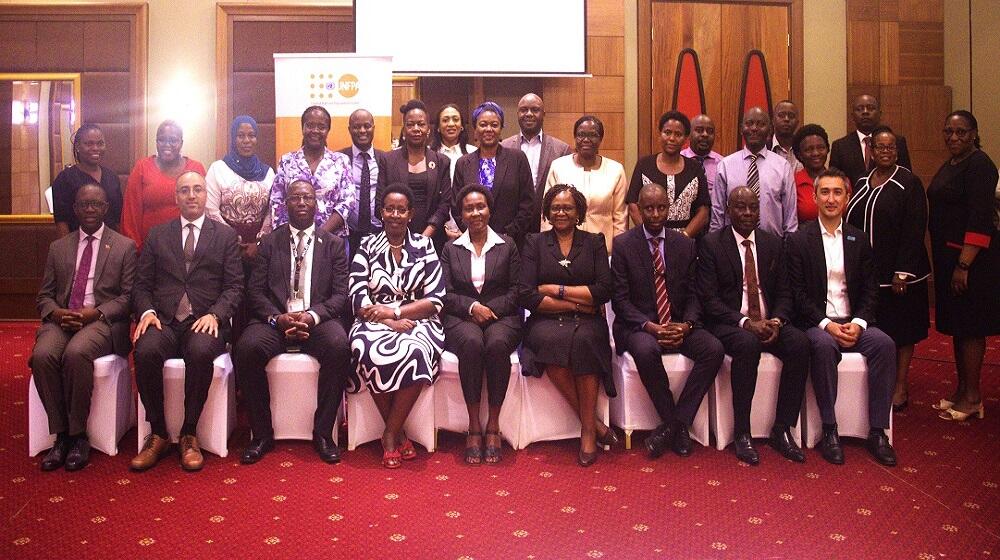KAMPALA: A coordination meeting for the Inter-Ministerial Committee to End Child Marriage and Reduce Teenage Pregnancy met to address the key priorities by recommitting to accelerate efforts to end these human rights violations using a multisector approach.
Convened by UNFPA in Kampala on June 24, the meeting was attended by, among other stakeholders, the Permanent Secretaries of the line ministries of Health, Ministry of Education and Sports, Ministry of Gender, Labor and Social Development, and the Ministry of Local Government.
In her remarks, the UNFPA Uganda Representative said the collaboration is a critical step in addressing these human rights violations that have reached pandemic levels:
“When a girl becomes pregnant, the chances of getting back to school are very minimal due to stigma, poverty, and lack of a supportive environment, and a direct link can be seen between teenage pregnancy and early and forced marriages.
She said in many cases, families may see marriage as a way to mitigate the perceived shame associated with an unmarried pregnant daughter, and the prospect of dowry can create a perverse economic incentive for families.
“This not only violates the rights of the girl but also perpetuates harmful gender inequalities,” Ms. Malunga said.
Despite the legal age of marriage being 18, the Uganda Demographic Health Survey 2022 reveals a stagnation in progress with child marriage at 33 percent and teenage pregnancy at 24 percent, exposing girls not only to the risks of sexually transmitted infections, including HIV, and unintended pregnancies but also hinders their educational and economic prospects.
“This persistence underscores the need for intensified efforts in enforcing existing laws, promoting girls' education and empowerment, and challenging harmful social norms.
“To address this, we must prioritize sexuality education that equips young people with the knowledge and skills to make informed choices, and access to Sexual and Reproductive Health and Rights services, especially family planning,” Ms. Malunga said.
The Representative further highlighted the urgent need for decisive action from all stakeholders through a multi-sectoral approach, involving government agencies, religious and cultural leaders, civil society organizations, and communities, adding that, while socioeconomic factors play a significant role, we must recognize that teenage pregnancy is not merely a consequence of poverty but also a driver of it.
Permanent Secretary, Ministry of Health Dr. Diana Atwine said adolescent pregnancy is both a public health and a development issue. However, she says winning this battle depends on collaboration through a multisectoral approach. Dr. Atwine emphasized the utilization of available policy frameworks, platforms, and programs to ensure strengthened coordination and accountability.
“The time is now to think and act. Teenage pregnancy and child marriage threaten gains we have registered under maternal, child, and adolescent health, in education and Social Development. The current statistics must drop and they must drop very quickly,” she said.
Permanent Secretary Ministry of Education Ms. Ketty Lamaro highlighted the need to consistently engage and harmonize our interventions as key sectors under the blueprint of the Human Capital Development Programme to deliver more efficiently.
Permanent Secretary, Ministry of Gender, Labour and Social Development Mr Aggrey Kibenge said as Uganda transitions to the National Development Plan (NDP) IV committing to the next five years, strengthening networks and implementation of the joint adolescent and youth frameworks like the UN Joint Programme on Adolescents and Youth.
Representing the Ministry of Local Government, Commissioner Charles Magumba emphasized the importance of engaging and involving family and community members to address child marriage and teenage pregnancy through frameworks like the Parish Development Model (PDM).
In conclusion, Ms. Malunga reaffirmed UNFPA’s commitment to end child marriage and teenage pregnancy to unveil the full potential of adolescents and young people and to contribute to the socio-economic transformation of Uganda.
“I call upon the Permanent Secretaries of the Inter-Ministerial Committee to End Child Marriage and Teenage Pregnancy meeting today, to take necessary action to accelerate the implementation of the National Strategy, as well as to create an enabling environment that enhances access to SRHR and family planning services for adolescents and youth,” Ms. Malunga said.
The meeting was also attended by a representative from UNICEF, technical officials from the Ministries of Health, Gender, Labour and Social Development, Local Government, Education and Sports, and civil society.
- Written by Evelyn Matsamura Kiapi


